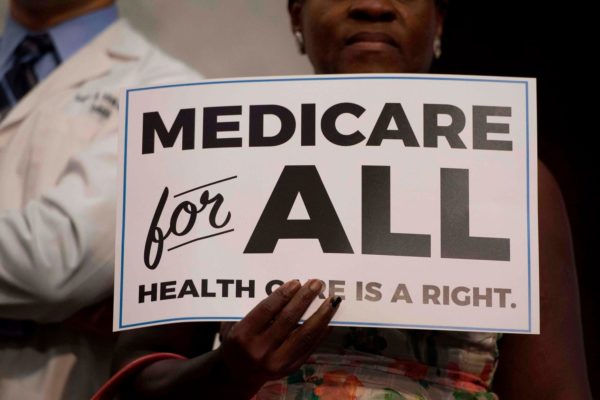

A sign at a Capitol Hill discussion by Sen. Bernie Sanders (I-Vt.) of Medicare-for-all legislation in 2017. (Jim Watson/AFP/Getty Images)
The United States is an optimistic society. Problems need to be framed in terms of solutions. Self-help, as I am forever pointing out, is all but a national state religion. To be told you have a “bad attitude” is a deadly insult.
So how is it that we increasingly can’t seem to get anything done?
I thought about this conundrum reading David Brooks’s most recent effort at the New York Times titled, ” ‘Medicare for All’: The Impossible Dream.” The problems are just too much to solve, he claims. People and companies alike would need to transition. Taxes would need to be increased. Jobs would be lost. So Brooks just gives up. “I’ve just never understood how we get from here to there,” Brooks writes.
Of course, when it comes to individuals, Brooks is forever the first to say we need to be held to account rather than throw up his hands. “People born into the most chaotic situations can still be asked the same questions: Are you living for short-term pleasure or long-term good? Are you living for yourself or for your children? Do you have the freedom of self-control or are you in bondage to your desires?,” he asked in 2015. Perhaps he should reframe the questions, and offer them up to the great powers holding back health-care reform.
But, more importantly, “how we get from here to there” isn’t a mystery. In our increasingly plutocratic society, money buys access to politicians and, in turn, it frequently buys results. Make no mistake, this stagnation and the resulting no-can-do attitude in the face of major problems are the result.
More than two-thirds of Americans support Medicare-for-all. This should hardly shock anyone, though it always seems to. But it’s not in the interests of the hospitals, the insurance companies, the pharmaceutical companies and the like to fix our health-care situation — there’s too much money to be made. And the health-care industry knows how to get its way. According to Open Secrets, no sector of the economy spent more on lobbying in 2018. And 2017. And 2016. As a result, instead of treating our health-care woes as the emergency that it is, many of our elected politicians and media pundits give a world-weary sigh, and tell us in a slightly scolding fashion to make do.
This extravagant spending in search of influence swamps Washington, turning right-wing, corporate friendly agendas into conventional wisdom. A study published by the progressive think tank Demos found big-money donors were significantly more conservative on a raft of issues ranging from financial regulation to austerity politics. Another report found congressional staffers believed the voters in their districts are significantly more right leaning than they actually are.
This is issue goes well beyond health care. About half of us believe we will be “personally harmed” by global warming, and yet President Trump is taking us backward, pulling the United States out of the Paris accord. Others politicians — of both parties — are casting doubt on the Green New Deal. When confronted by a group of children and their teachers and asked to explain her skeptical take, Sen. Dianne Feinstein (D-Calif.) responded, “There’s no way to pay for it.” One of the children, showing a precocious understanding of exactly how the United States works, replied, “We have tons of money going to the military.” Feinstein’s response was to lecture the children on the ways of Washington.
It went over like a lead balloon and for good reason: When it comes to ensuring money goes to those with money, the U.S. government remains quite adept. An astonishing number of Americans believe the rich and corporations should pay a greater amount of their earnings, wealth and profits to the Internal Revenue Service. So what did we get? A tax reform package that cut taxes on corporations and wealthy Americans, with the promise the gains would trickle down to the greater population. That hasn’t happened, of course. Wages remain all but stagnant when inflation is factored in.
The United States was not always like this. Once we were the country that passed ambitious legislation such as Social Security and Medicare. We said we would send a man to the moon, and ultimately ended up sending many men and women into space. The difference between then and now isn’t that our national character shifted. It’s that our system became increasingly corrupt and stasis oriented.
Read more:
Paul Waldman: Medicare-for-all is very popular. But Democrats face a massive fight over it.
Paul Waldman: The media is badly botching the Medicare-for-all debate
Raúl Grijalva: Be progressive, Democrats, not merely liberal
Elizabeth Bruenig: My advice to progressives: Don’t back down